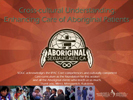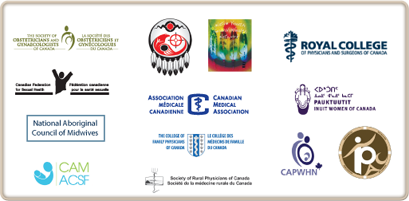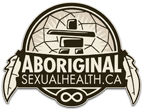SOGC Members & Health-Care Professionals
Since 2006, Aboriginal health has been a key pillar of the SOGC's strategic directions. Partnering with Aboriginal and non-Aboriginal stakeholders and organizations, we develop policies, guidelines, continuing medical education sessions, and health promotion materials. Our goal is to advance Aboriginal women's health by providing the support and resources that health professionals need to deliver culturally-competent care.
Health Professionals Working with First Nations, Inuit and Métis consensus guideline
In 2001, the SOGC published an innovative guideline to give health practitioners a better understanding of how to provide culturally-safe care to Aboriginal Peoples throughout Canada. Ten years later, in partnership with the National Aboriginal Health Organization (NAHO) and with generous support from Nations and Inuit Health Branch (FNIHB) of Health Canada, we are advancing our guideline. Health Professionals Working with First Nations, Inuit and Métis consensus guideline provides up-to-date information on key topics such as demographics, health systems and policies, sexual and reproductive health and maternal and child health, in an effort to provide health professionals with the knowledge and tools to deliver culturally safe care to First Nations, Inuit and Métis women, and through them to their families.
Targeting women's health professionals including obstetricians, gynaecologists, family doctors, midwives and nurses, the guideline provides evidence-based recommendations, clinical tips, graphics and case study materials with key learning points. Additionally, a companion piece and infographic are available, highlighting key facts, tips and information in accessible language for distribution among First Nations, Inuit and Métis women, social services workers, health navigators, community health workers, cultural-liaison workers, health services researchers, policy analysts and other stakeholders.
Consultation and collaboration with Aboriginal organizations and medical organizations was a valued part of the development process. The guideline is endorsed by:
- Aboriginal Nurses Association of Canada
- Canadian Association of Perinatal and Women's Health Nurses
- Canadian Association of Midwives
- Canadian Medical Association
- College of Family Physicians of Canada
- Indigenous Physicians Association of Canada
- Inuit Tapiriit Kanatami
- Métis National Council
- Minwaashin Lodge
- National Aboriginal Council of Midwives
- National Aboriginal Health Organization
- Native Women's Association of Canada
- Native Youth Sexual Health Network
- Pauktuutit Inuit Women of Canada
- Royal College of Physicians and Surgeons of Canada
- Society of Rural Physicians of Canada
SOGC's Regional CMEs: Enhancing Care of Aboriginal Peoples
 The SOGC's Aboriginal Health Initiative (AHI) develops and presents CME sessions aimed at improving awareness among health care professionals concerning Aboriginal women's health. We aim to support the ability of health care professionals to provide culturally-safe care.
The SOGC's Aboriginal Health Initiative (AHI) develops and presents CME sessions aimed at improving awareness among health care professionals concerning Aboriginal women's health. We aim to support the ability of health care professionals to provide culturally-safe care.
These sessions provide health-care professionals with an overview of the experiences of Aboriginal Peoples in Canada and respond to some key questions: What is culturally-safe care? What are some of the barriers to health and health care for Aboriginal women? What are the broader social determinants that shape Aboriginal women's sexual and reproductive health and what difference will this knowledge make to my clinical practice?
Is Your Care Culturally Safe? Join us at one of our upcoming CMEs and advance your skills in delivering high-quality, effective care for one of Canada's youngest and fastest growing population!
Aboriginal Health Initiative in the SOGC News
The SOGC News, our monthly member newsletter, carries editorials from our leaders, news from the Society, articles on the health-care sector, as well as stories about our members. Activities of the AHI are regularly featured here too. To catch up on news from our corner, click the links below.
- Pauktuutit Inuit Women of Canada: Spotlight on one of our partners
- The art of a guideline: Skywoman (pg 12)
- SRHA Day: What do you know about Aboriginal women’s sexual and reproductive health? (pg 10)
- A spotlight on the National Aboriginal Council of Midwives (pg 12)
- Practice relations: A model of obstetrician-midwife collaboration for improved Aboriginal maternal health (pg 13)
- Bringing back the doula: A look at a unique program to enhance birthing support for Aboriginal women (pg 12)
- A look at Seventh Generation Midwives Toronto (pg 10,12)
Non-Insured Health Benefit (NIHB)
 NIHB is a national health benefit program that provides health coverage for eligible First Nation and Inuit people residing in Canada. The aim of the program is to supplement provincial or territorial health benefits for Aboriginal Peoples.
NIHB is a national health benefit program that provides health coverage for eligible First Nation and Inuit people residing in Canada. The aim of the program is to supplement provincial or territorial health benefits for Aboriginal Peoples.
Yet, eligible individuals sometimes face difficultly accessing this benefit. Want to know how you can help?
Get some background information. Read our article in the SOGC news.
Support access to information. See the AFN's NIHB client handbook.
Using FNIHB's NIHB drug benefit list, we have created a helpful fact sheet. Click here to download your copy today and help ensure Aboriginal women have access to the benefits they are entitled to.
Policy Statement: Returning Birth to Aboriginal, Rural, and Remote Communities
 Did you know? 21% of women in Canada - many of them Aboriginal - live in rural communities. With routine birthing evacuations, Aboriginal women are regularly forced to experience birth alone, far from their homes and communities. For many healthy pregnant women, this has resulted in stressful, lonely and costly births, with negative health outcomes.
Did you know? 21% of women in Canada - many of them Aboriginal - live in rural communities. With routine birthing evacuations, Aboriginal women are regularly forced to experience birth alone, far from their homes and communities. For many healthy pregnant women, this has resulted in stressful, lonely and costly births, with negative health outcomes.
The SOGC strongly supports returning birth to rural and remote communities for low-risk women. To read more, click here.
Joint Policy Statement: Sexual and Reproductive Health Rights, Realities and Access to Services for First Nations, Inuit and Métis in Canada
In 2010, the SOGC teamed with the Assembly of First Nations (AFN), the Native Youth Sexual Health Network (NYSHN), Pauktuutit Inuit Women of Canada, and the Canadian Federation of Sexual Health (CFSH) to create a joint policy statement, affirming the sexual and reproductive health (SRH) rights of First Nations, Inuit and Métis (FNIM) women and youth.
Through this Statement, we aim to foster awareness about FNIM SRH rights and realities among health professionals, organizations and stakeholders across Canada, many of whom work with Aboriginal women and youth. We aim to support the delivery of culturally-safe care. This document also provides a common starting point, helping us move forward in the development of accessible, culturally-relevant public health materials and youth-driven, community-based projects to support improved SRH.

Endorsed by:
UN Declaration on the Rights of Indigenous Peoples
There are over 370 million Indigenous people worldwide. In Canada, Aboriginal Peoples are the youngest and fastest growing part of our population. But what is being done to protect and promote the health rights of Aboriginal Peoples, or to ensure equitable access to the resources and opportunities that support health and well-being? In Canada, how are women's sexual and reproductive health rights protected and promoted?
Indigenous women are among the most disadvantaged and victimized peoples in the world. This holds true in Canada as well. Yet, on September 13, 2007, when the United Nations (UN) General Assembly adopted the UN Declaration on the Rights of Indigenous Peoples by an overwhelming vote of 144-4, Canada was one of only four states that opposed the Declaration.
Canada's recent endorsement of the Declaration is one step in the right direction. The SOGC strongly supports Canada's endorsement. With Aboriginal Health as one of the SOGC's Strategic Directions, we are committed to advocating further such actions.
